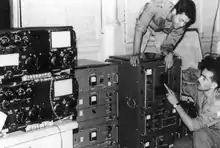Département du Renseignement et de la Sécurité
The Department of Intelligence and Security (DRS) (Arabic: دائرة الإستعلام والأمن) (French: Département du Renseignement et de la Sécurité) was the Algerian state intelligence service. Its existence dates back to the struggle for independence. In 2016 it was dissolved by President Abdelaziz Bouteflika and replaced by the Direction des services de sécurité.[1]
| Agency overview | |
|---|---|
| Formed | 1990 |
| Dissolved | 2016 |
| Headquarters | Algiers, Algeria |
| Annual budget | Classified |
History
Formation, MALG

The DRS was formed as the Ministère de l'Armement et des Liaisons générales (MALG) during the Algerian War for independence, under the direction by Abdelhafid Boussouf, whose role was to lead both the national and international networks of the Front de libération nationale (FLN). After independence in 1962, and particularly with the accession of Houari Boumédiène to the leadership of the country in 1965, the Algerian intelligence services greatly professionalised and institutionalised.
MALG was organized under five departments :
- DTN: National Communications department
- DDR: Documentation and Research department, responsible for military research
- DVCR: Vigilance and Counter Intelligence
- DLG: Army post network
- Management of logistics for acquiring, storing, and routing weapons and equipment.
Sécurité Militaire
This change of internal organization was modeled to a large extent on the intelligence and internal security services of the then Eastern bloc Nations. Renamed Sécurité Militaire (SM) its directives were:
The first appointed Chairman of Military Security was the colonel Kasdi Merbah who stayed until the death of president Boumédiène in 1978. Then he was succeeded for a short time by colonel Yazid Zerhouni. President Chadli Bendjedid, who mistrusted the SM, dismantled it and renamed it the DGPS. Chadli appointed to the chair of the DGPS general Lakehal Ayat, reorganising the agency to work solely in foreign intelligence.
DRS
The riots and turmoil of October 1988 caused president Chadli Bendjedid to dismiss General Ayat, who was succeeded by General Betchine. His tenure saw major political change, beginning with the advent of a multi-party political system and the rise of the Islamist movement of the FIS. Betchine was then replaced by Mohamed Mediène in November 1990, who served until 2015. Following this, the Services changed its name once again, from DGPS to DRS. Outside observers have charged that Mediène was one of the junta of generals who forced the cancellation the 1991 elections which the Islamists were set to win, plunging the nation into a war against the Islamist, and greatly increasing the power of the military—and the DRS—in Algeria's government.[2]
It was in this period that the DRS reasserted its role in internal security, becoming an active player in the Algerian Civil War of the 1990s.[3][4] It reportedly had as many as 100,000 agents that infiltrated many segments of society.[5] DRS agents infiltrated and manipulated terrorist groups, and repressed different Islamist groups. It also blocked negotiations both by the ruling and opposition powers with the FIS.
In September 2013, the DRS was reorganized to bring more of its power under the state's control.
The Groupe d'Intervention Spécial (GIS) is a special force (300 members) under the direction of the DRS.
Chairmen of the DRS
- Abdelhafid Boussouf from 1954 to 1958
- Houari Boumédiène from 1958 to 1965
- Kasdi Merbah from 1965 to 1978
- Yazid Zerhouni from 1979 to 1981
- Lakehal Ayat from 1981 to 1988
- Mohamed Betchine from 1988 to 1990
- Mohamed Mediène from 1990 to 2015
- Athmane Tartag since 2015 to 2019[6]
References
- Chikhi, Lamine (June 16, 2016). "Algeria's Bouteflika dissolves DRS spy unit, creates new agency: sources". Reuters. Retrieved June 16, 2017.
- Omar Ashour. Islamist De-Radicalization in Algeria: Successes and Failures. The Middle East Institute Policy Brief No.21. November 2008 (p.11, n.68)
- Evans and Phillips (2008), passim
- Jeanne Kervyn and François Gèze. L’organisation des forces de répression. Comité Justice pour l'Algérie, Dossier n° 16. September 2004.
- Duteil, Mireille (14 April 2014). "Mohamed Mediène, l'homme le plus mystérieux d'Algérie". Le Point. Retrieved 7 May 2015.
- "إنهاء مهام اللواء بشير طرطاق من على رأس المخابرات". النهار أونلاين. 5 April 2019.
External links
- Algerians count cost of burying the past. Financial Times. July 4, 2007.
- Algérie. Pratique persistante de la torture par la Sécurité militaire dans des lieux tenus secrets. Amnesty International. 10 June 2007.
- Algeria: Unrestrained powers: Torture by Algeria's Military Security. Amnesty International. Index Number: MDE 28/004/2006. 9 July 2006.
- Immigration and Refugee Board of Canada. Algeria: The anti-terrorism campaign conducted by the army between 1997 and 2000, including the army's strategy, 27 August 2007. DZA102593.E. Online. available at UNHCR Refworld, accessed 30 March 2009.
- Martin Evans, John Phillips. Algeria: Anger of the Dispossessed. Yale University Press (2008) ISBN 0-300-10881-8
- Hugh Roberts. Demilitarizing Algeria. Carnegie Papers Middle East Program, Number 86. May 2007.
- Yahia H. Zoubir, Haizam Amirah Fernández. North Africa: Politics, Region, and the Limits of Transformation. Routledge (2008) ISBN 0-415-42921-8 pp. 299–300